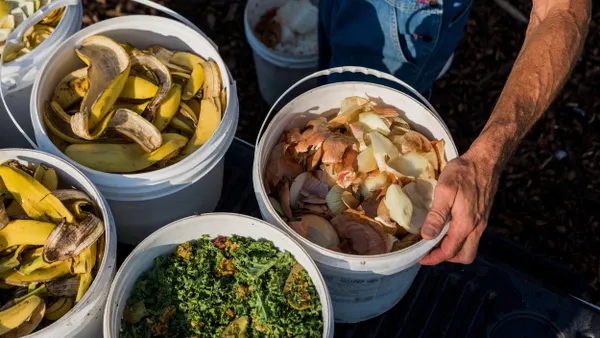Dive Brief:
- Divert, a Massachusetts-based technology company focused on mitigating food waste, announced last week its retail customer base has grown by 40% in the last two years to more than 5,200 stores across all 50 states — including among five Fortune 100 companies.
- The company currently has six modular sites with depackaging capabilities to prepare material for third-party organics processing, plus two existing anaerobic digesters in California and Massachusetts. Divert is developing three more digesters in California, Pennsylvania and Washington that will produce renewable natural gas.
- The company was founded in 2007 but has largely kept a low profile. Last year, Divert was acquired by private equity firm Ara Partners and received $100 million in growth equity.
Dive Insight:
The conversation around food waste has evolved significantly since Divert was founded and the company sees itself as well-positioned to meet the moment.
Co-founder and CEO Ryan Begin said many retail clients used to be focused on achieving zero waste targets. Now, as data becomes “the lifeblood of retail,” Begin said clients are more focused on carbon intensity and other metrics rather than strictly following the U.S. EPA’s food recovery hierarchy.
“If I have to ship my animal feed 500 miles, or there's a digester that's 20 miles away, if you look at the lifecycle cost it actually is better to keep that material closer,” said Begin. “I think there's more sophistication working its way into the marketplace and awareness among our customers.”
Divert estimates it keeps 163,000 tons of food out of landfills annually through a variety of services for clients that include Target and large grocery chains. It charges a monthly subscription fee for access to its technology, which helps track product management with the ultimate goal of “protecting the value of food.” When material is destined for organics recycling, Divert utilizes reverse logistics to aggregate it from multiple stores and charges an additional processing fee.
“We’re not looking at waste costs as setting the market price. It's what can we deliver with food donation, with source reduction, with data,” said Begin, adding the goal is to offer universal programs that don’t depend on state or local policy drivers and that work for retailers whether they’re “in San Francisco or Cincinnati.”
According to the nonprofit ReFED, retailers generate an estimated 10.5 million tons of surplus food each year, more than one-third of which is disposed. ReFED says retailers “play an integral role in connecting all points in the supply chain,” with the potential for billions of dollars worth of net financial benefit if they focus on priority areas such as enhancing product distribution and refining product management.
ReFED’s capital investment tracker cites 2021 as a record year for investment in prevention-focused companies (a category that includes Divert), with 115 deals worth a collective $1.45 billion. According to the tracker, Divert raised $3.8 million in venture funding from MissionPoint Partners and other investors in 2018.
While much of Divert’s work is focused on reducing and recovering waste food, the company is also a growing player in organics processing. It declined to share specifics, but a representative said its six modular sites are located “across the West Coast, Southeast, Northeast and Upper Midwest.” For the larger, integrated projects, Divert waits to identify high-volume markets rather than try to induce demand by building sites in areas without sufficient volume.
The company’s initial digestion projects were a 150-ton-per-day site co-located with Kroger in California and a 95-ton-per-day site with a subsidiary of Ahold Delhaize in Massachusetts. Begin said the $100 million investment will help fund three new projects, all of which Divert will own. The RNG it produces qualifies for D5 RIN credits under the federal Renewable Fuel Standard and has a negative carbon intensity under California’s Low Carbon Fuel Standard, which Begin said makes the voluntary market an attractive option for selling the gas.
RNG is poised for further investment, given rising interest from landfill operators and organics recyclers alike. In one example, BlackRock reportedly spent around $700 million to acquire large-scale digester operator Vanguard Renewables based in part on its potential to produce RNG. Plus, new incentives included in the Inflation Reduction Act are seen as a boon for the biogas sector.
“We're in the right place, right time with the right capital partners and the right customers, the right scale, to really take advantage of that and build the infrastructure,” said Begin.












